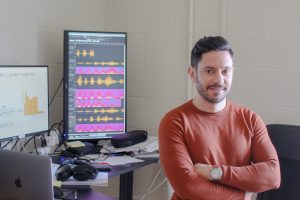Speech recognition software and machine learning tools are being used to create diagnostic test for Parkinson’s Disease
Diagnosing Parkinson’s Disease is tricky. Instead of the blood tests and imaging used to help detect other diseases, such as cancer, diabetes, and heart problems, clinicians must rely on observations of the way patients move and speak, which is an often long and painstaking process.
Laureano Moro Velazquez wants to change that. A post-doctoral student in the Department of Electrical and Computer Engineering and the Center for Language and Speech Processing, Moro Velazquez is using speech recognition software and machine learning tools to develop a new diagnostic test that can support the clinical diagnosis, making the whole process faster and more accurate.
“The act of speaking is very complex because you move the tongue, lips and jaw,” Moro Velazquez said. “You’re coordinating and moving so many things at the same time, and most of them are affected by Parkinson’s Disease. Why not adapt already-existing advanced speech recognition technologies and put them to work for this task?”
Using databases of human speakers featuring voices from around the world, Moro Velazquez has created algorithms that search for irregularities in how they speak. This approach makes an accurate diagnosis between 90 and 95 percent of the time. The main obstacle, he says, is consistency: When using certain databases, his diagnosis rate has been closer to 65 to 70 .
To improve the approach’s consistency, Moro Velazquez is working with doctors at the Johns Hopkins Medical Hospital to analyze his and other new approaches with patients. The final goal is to put his best and most successful systems to the test in clinical trials .
“We already have some very good results; we just need more databases and to get more involved with the hospital,” Moro Vasquez said. “We need to test our systems on a daily basis. When they have a new patient, we want to see if this system is working day by day.”
In fact, it was opportunities to join forces with colleagues at Johns Hopkins’ world-renowned School of Medicine that was one of the primary factors influencing Velazquez to come to Johns Hopkins.
“It’s a perfect combination for my research because Johns Hopkins has one of the best hospitals in the world that is willing to collaborate, as well as having many pioneers in my field here at CLSP, including my mentor, Najim Dehak,” Moro Velazquez said. “Being here also adds a little bit of pressure, which I like, because you are in a place where everyone is brilliant, so you have to try your best to be brilliant too. It pushes you to go further and gives you more ambition. I’m definitely more ambitious after coming to Johns Hopkins.”



